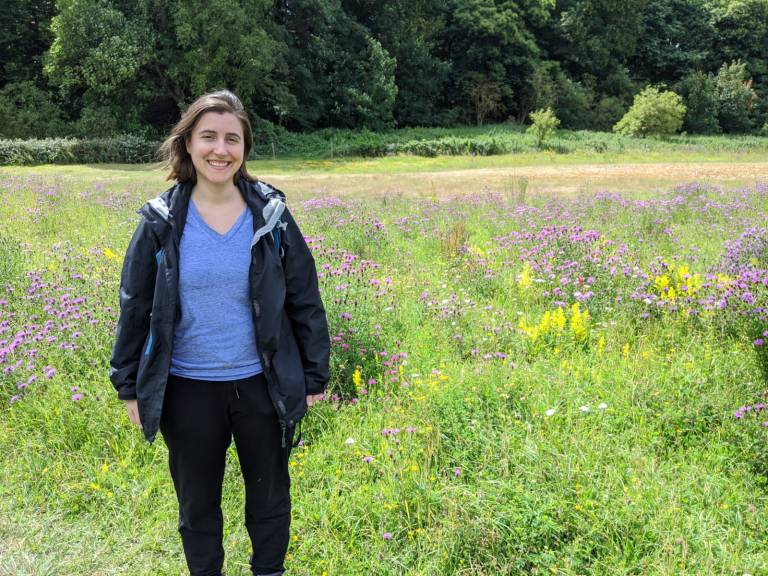LGBT+ History Month | Interview with Dr Soraya Dunn
1 February 2022
To mark the start of LGBT+ History Month on 1 February 2022, we spoke to Dr Soraya Dunn (UCL Ear Institute) who is part of The Faculty of Brain Sciences LGBTQ+ Equity Group to discuss the importance of this month.

This LGBT+ History Month is the 50th anniversary of the first Pride March in the UK. This provides an opportunity for us to reflect on how the lived experiences of LGBTQ+ people have changed. Reflecting on your own experience, why do you think it is important for universities to continue celebrating LGBT History Month?
There have been so many attempts to erase LGBTQ+ history. Section 28, legislation that banned the “promotion” of homosexuality, was in place for most of my school years. This legislation stopped all education and positive representation of LGBTQ+ identities and history in schools across the UK; it was repealed in 2003 but the effects can still be seen today. Celebrating LGBTQ+ History Month, especially within the context of educational institutions, can help to repair that damage. I also think the commercialisation of Pride has meant that we really need our universities and other non-commercial institutions to provide some broader context and show us that LGBTQ+ individuals are a valued part of our cultural and intellectual lives.
UCL is a proudly international university, so celebrating LGBTQ+ history month also sends an important message of inclusion and acceptance to our international students- some of whom will come from countries where being queer is criminalised and will perhaps not have been able to live their own authentic lives. I myself am half Iranian and have many family members in Iran, where being queer is punishable by death. We need to demonstrate our values and I think celebrating LGBTQ+ history month is a good start!
For anyone unaware of The Faculty of Brain Sciences LGBTQ+ Equity Group, can you explain what it is that you aim to achieve and how staff and/or students can help?
The fundamental aim of the FBS LGBTQ+ Equity group is to make our faculty a safe and welcoming place for people of all sexual and gender identities; as one of my fellow committee members said, a place where LGBTQ+ people can be celebrated not just tolerated.
It feels particularly pertinent for members of the faculty to rally around our LGBTQ+ members given UCL's recent decision to permanently leave Stonewall’s Workplace Equality index and Diversity Champion schemes. When polled, every LGBTQ+ and EDI group asked at UCL voted to stay in the scheme, but ultimately the views of the community were not enough. Staff and students can help by listening to LGBTQ+ staff and students, and amplifying their voices. And when you can, vote with us!
Another thing staff and students can do, is if you don’t see yourself represented on the committee, please consider joining us!
As well as your role on the committee, you are also a postdoctoral researcher in Neuroscience at the Ear Institute. Have you come across or conducted any research in this field that focuses on the experience of LGBTQ+ individuals?
I am currently involved in basic research - the brain mechanisms involved in forming memories- so very far from anyone’s lived experience!
The theme for this year’s LGBT+ History Month is ‘Art’. Do you have a favourite LGBT+ artist that you’d like to share with the rest of the faculty?
I’m too indecisive to pick one of anything, but I managed to whittle it down to two. Jasmine Lee-Jones is a phenomenally talented playwright and performer - I was super lucky to catch ‘seven methods of killing kylie jenner’ at the Royal Court Theatre, and she was only 20 when it was produced! The other is Desiree Akhavan who is an Iranian-American writer/actor/director. I really enjoyed her first film ‘Appropriate Behaviour’ about an Iranian-American woman navigating her bisexuality - I’ve never felt so seen!
Related
 Close
Close

